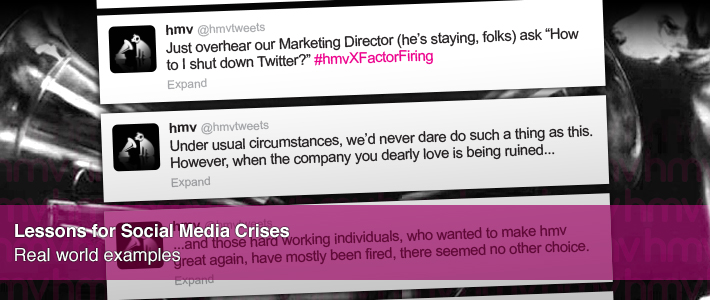
We emphasize the importance of putting great care into managing your brand’s social media accounts, but it cannot be stressed enough.
Online presence and disposition, whether personal or business-related, now have more impact than ever before. Focusing on the corporate perspective, a brand’s social identity as a business can either make or break them. Anything and everything that brands post on their social media accounts is instantly captured by a large portion of their customer base – with the potential to go completely viral.
When it rains, it pours. In these past few weeks our social media feeds have been flooded (pun intended) with very unfortunate and avoidable social media mishaps, namely the HMV and Applebee’s fiascos.
The complete HMV situation can be found online but here is the gist:
Last Thursday, HMV had plans to lay-off 60 of their staff, plans which were made public knowledge via Twitter. The entire layoff, including a quote from the Marketing Director, was tweeted live by an anonymous firee who hijacked the official HMV Twitter account. Needless to say, the situation went completely viral.
Next, Applebee’s. Again, a wonderfully crafted play-by-play of the fiasco can be read in numerous online articles, but in summary:
- In reaction to a photo posted by one of their employees, Applebee’s fired said employee. They posted that they wished the situation hadn’t taken place and that their customer’s rights to privacy hadn’t been violated.
- As a response to the online rage directed at them, Applebee’s posted a comment on their own status – at 3:00 AM.
- This sparked a massive commenting war – in which Applebee’s chose to partake.
- Abblebee’s then tried to delete the messages and deny that the commenting war ever happened, despite screen shot proof.
- This situation now has 1.4 M views.
How did each company deal with their issues? Not well. HMV did not publicly address the issue but rather chose to delete the tweets altogether and pretend the situation never happened. Applebee’s went to the other end of the spectrum and addressed the situation at 3:00 AM, both deleting comments made by customers and tagging them, copy and pasting a reply. Finally, they started outright arguing with their customers and ended up deleting a large portion of the account of the situation from their page.
How could they have prevented any of this? Three words: Education, Accountability and Awareness.
- Education: Neither of the two companies seems to have properly educated their employees on social media use (or power, for that matter). Assuming that someone who uses social media for personal use will be able to use it properly in a corporate setting is a big mistake. Rather, educating all employees in the proper corporate use of social media, especially Upper Management, creates a community of people who all know exactly how to use this medium and know the potential it has for good and evil. The individuals responsible for managing these accounts should have been specifically trained in the best practices of crisis management. The brands should have owned up and apologized instead of trying to pretend the situation didn’t happen.
- Accountability: In both fiascos, no one person seems to have been responsible for the social media of these large companies. Therefore, the employee using the account is neither identifiable nor accountable, adding to the gravity of both situations. A social media role should be created, present and maintained. This puts the accountability on the employee, making it far easier hold someone responsible. As well, when an individual is hired who specializes in social media, they have a reputation to maintain and something to lose if they post inappropriately on behalf of your brand.
- Awareness: Even a seemingly unimportant or small post can have a huge effect. Had anyone in charge, ie: Upper Management, been following the social media representation of their respective companies, both issues could have been stopped before they got out of hand. By monitoring a brand’s online presence, companies can deal with negative situations swiftly and know what is being said about them on the internet before it is too late.
These three concepts are vital in the proper corporate use of social media. Education is a power-sharing tool and creates a consciousness of corporate online presence. Accountability gives an employee ownership and a company advanced knowledge and safety in the world of social media. Awareness gives those with authority a heads up of both the good and the bad coming their way.
While it comes with its fair share of pain, sometimes it takes a bad example to see how to do something right. In this case, two such examples were provided. By taking the advice above and using social media to corporate advantage, companies can make certain they do NOT provide us with a third example.
